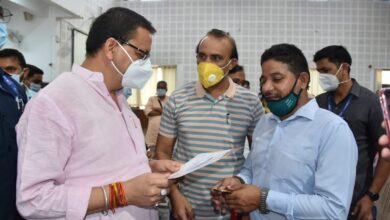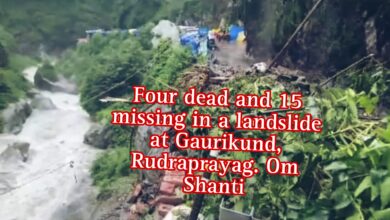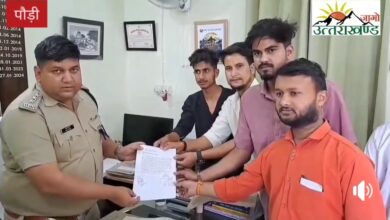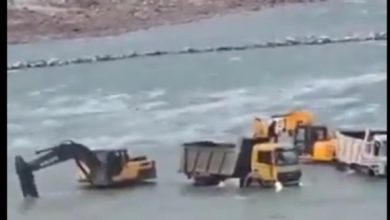Member, NDMA Rajendra Singh sheds light on credible preparations by NDMA to counter natural calamities
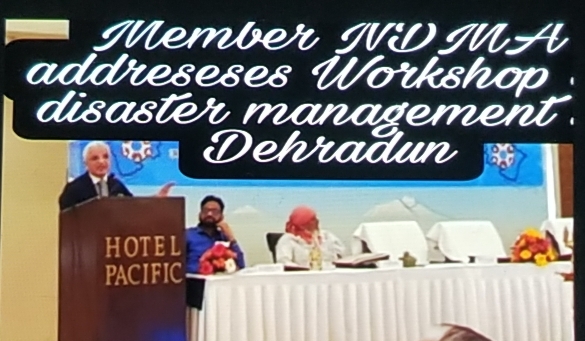
In India’s 36 states and union territories, about 27 percent area is affected by natural calamities with 60 % land area affected by the earthquake possibilities. About 5700 kilometre coastal area of the country is sensitive from the point of view of cyclonic storm and Sunami.
The government has allocated a budget of Rs 370 crores and by the next year about one lakh volunteers as first responders would be fully and adequately trained to deal with the natural calamities strongly in 350 districts of the country with two hundred volunteers trained in Haridwar, Uttarakhand to deal with various natural calamities in the Himalayan state with more youths being trained further in the near future.
The former DG of Indian Coast Guard and currently the member of National Disaster Management Authority Rajendra Singh was on Wednesday addressing a well attended Workshop in Dehradun organised by Uttarakhand State Disaster Management Authority and Disaster Management n Rehabilitation department to create mobilisation and awareness among people to devise ways and means n sensitivity to effectively cope and counter the natural calamities in future. The workshop was organised on the ocassion of the International Day for Disaster Risk Reduction.
The workshop deliberated on various issues related to natural calamities and credible initiatives to counter them with the active participation of environmentalists, senior officers of NDMA, geological scientists, seismologists, journalists and volunteers etc. Good number of participants from various government departments of Uttarakhand viz police, health, education, engineering etc participated in this workshop. Padam Shri, eminent environmentalist Dr. Anil Prakash Joshi was the star attraction of the show apart from the special guest n NDMA member, n former DG ICG Rajendra Singh. Lauding the immense contribution of prime minister Narendra Modi in countering natural calamities in the country Rajendra Singh said that our capable PM usually says : no body is safe till all are not secured.

Picture n source Hill mail
He said that at the pan India level work on countering and controlling natural calamities is being carried out on massive scale on prime minister Narendra Modi’s direction. While on the Western coastal region good number of shelters are being built for protection n safeguards from cyclonic thunderstorm, massive number of trained volunteers as first hand responders are also being readied to deal with such cyclones.
He stressed the need for tightening our belts to be always ready to deal with such emergency situations during natural calamities as the basic objective/ motto of NDMA is that nobody is left behind during happening of dreaded disasters. Shedding light on catastrophic disasters occurring in various states of the country and the role of NDMA n state disaster response force and other rescue agencies, Rajendra Singh said when we talk of Uttarakhand, there are several forms of natural calamities in this himalayan state n it’s because of this that the NDMA has mainly focussed on preparations in addition to protection. Out of the budget of 370 crores, the first instalment has been already sent to various states to effectively deal with any eventuality said member, NDMA Rajendra Singh.
The NDMA has trained 200 first responders as volunteers in thirty districts of over 25 states. So far 6000 volunteers have been fully trained and equipped with disaster management training n tips je added. The prime objective of NDMA is to prepare adequately trained 100000 ( one lakh volunteers) in 350 districts of the country at the earliest. Emphasising the need to train as much a volunteers it can NDMA member Singh said that these friends in disaster ( Aapda Mitra) will work as a bridge to carry forward and mobilise vast sections of the people not only about prevention from natural calamities but will also take forward the government policies among masses.
Speaking in detail about various aspects of the ecological disasters and the NDMA subsequent preparations Rajendra Singh said, when the disasters arrive, various departments of the government is due separate alerts. Now, they are devising a ” COMMON ALERT PROTOCOL SCHEME”, which will come into existence in s year’s time said Mr. Singh. This will help in alerting people of the catastrophic affected areas with this single APP. In addition to this revolution at invention NDMA Rajendra Singh said that Uttarakhand being the catastrophic state where disasters are a common feature, a batalion has been given to it to effectively deal with the critical situation, during suc calamities.

Member, NDMA Rajendra Singhji with the author Sunil Negi
The NDRF has also been allocated funds in order to enable them enhance their technological capabilities in this context. The eminent environmentalist and Padmashri Professor Anil Joshi while reiterating on the need on formulating a policy on natural calamities and subsequent redressal in view of critical circumstances in Uttrakhand said that there is an urgent need to propagate credible information and mobilisation through schools and students to counter or deal with such calamities among masses.
The additional secretary Dr. Srivastava delivered his first speech and dwelt on various aspects of disasters and gave detailed description of the various sessions to take place in the workshop. Dr S. Satya Kumar, scientist, Dr. Piyush Rautela from State traditional Disaster management technique, Dr. Kulanand Sai of Wadia geological Institute, Dr. Kamal of IIT Roorkie , Prakash Chouhan, IIRS and Jitendra Kumar Sonkar of Uttarakhand state disaster management authority etc also spoke on this ocassion and threw light on disaster management, recovery, protection and social participation aspects in critical situations.

